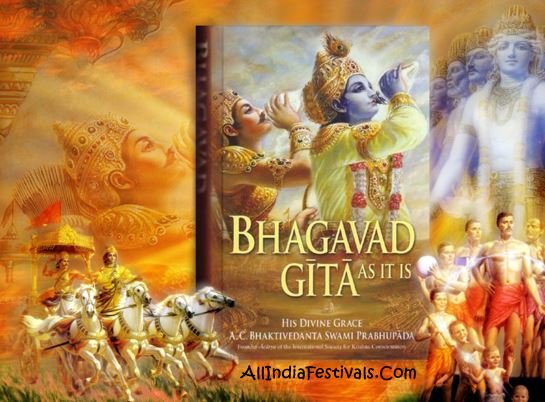
Another Hindu legend states that Vyasa narrated it while the lord Ganesha broke one of his tusks and wrote down the Mahabharata along with the Bhagavad Gita.
Srimad bhagavad gita quotes full#
In the Indian tradition, the Bhagavad Gita, as well as the epic Mahabharata of which it is a part, is attributed to the sage Vyasa, whose full name was Krishna Dvaipayana, also called Veda-Vyasa. The Bhagavata Gita is attributed to the sage Vyasa. The work is also known as the Iswara Gita, the Ananta Gita, the Hari Gita, the Vyasa Gita, or simply the Gita. This is not to be confused with the Shrimad Bhagavatam, which is a Purana dealing with the life of the Hindu God Krishna and various avatars of Vishnu. In India, its Sanskrit name is often written as Shrimad Bhagavad Gita, श्रीमद् भगवद् गीता (the latter two words often written as a single word भगवद्गीता), where the Shrimad prefix is used to denote a high degree of respect. Accordingly, the title has been interpreted as "the word of God" by the theistic schools, "the words of the Lord", "the Divine Song", and "Celestial Song" by others. Religious leaders and scholars interpret the word Bhagavad in a number of ways. The Gita in the title of the Bhagavad Gita means "song".


Krishna counsels Arjuna to "fulfill his Kshatriya (warrior) duty to uphold the Dharma" through "selfless action". He wonders if he should renounce and seeks Krishna's counsel, whose answers and discourse constitute the Bhagavad Gita.

At the start of the Dharma Yuddha (righteous war) between Pandavas and Kauravas, Arjuna is filled with moral dilemma and despair about the violence and death the war will cause in the battle against his own kin. The Gita is set in a narrative framework of a dialogue between Pandava prince Arjuna and his guide and charioteer Krishna, the Supreme Personality of Godhead. It is considered to be one of the holy scriptures for Hinduism. The Shrimad Bhagavad Gita ( / ˌ b ʌ ɡ ə v ə d ˈ ɡ iː t ɑː/ Sanskrit: श्रीमद्भगवद्गीता, romanized: śrīmadbhagavadgītā, lit.'The Song by God' ), often referred to as the Gita ( IAST: gītā), is a 700- verse Hindu scripture that is part of the epic Mahabharata (chapters 23–40 of book 6 of the Mahabharata called the Bhishma Parva), dated to the second half of the first millennium BCE and is typical of the Hindu synthesis.


 0 kommentar(er)
0 kommentar(er)
